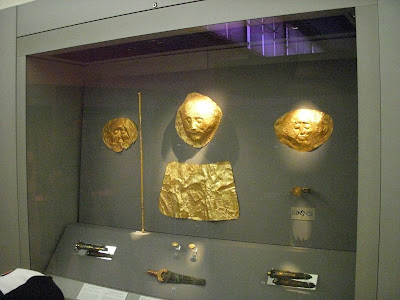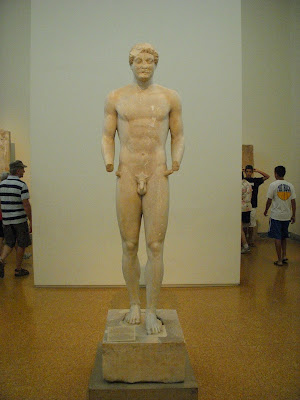Most people probably feel that mythology is s dead art. Perhaps others see fantasy and science fiction as modern forms of myth. However, there is a form of mythology that is ubiquitous to our everyday life: advertising.
In Greek, the word myth simply means “story.” Advertising is without a doubt a form of telling a story. More importantly, advertising shares a very interesting characteristic with traditional myths; each has both an obvious and an implied message. It is the implied message that carries advertising into the realm of mythology.
Imagine a cleaning product commercial. It is irrelevant what product is being sold or what format the commercial is in. Two messages are being proposed.
The first is obviously that the product being sold will benefit the consumer. The strengths of the product are lauded, often an example is given. Perhaps imaginary characters appear and metaphorically demonstrate the cleaning action of the product. This is the myth of the commercial.
However, there are deeper messages imbedded within all commercials. It is not sinister; if anything, it has been the driving force behind the development of our culture. Let’s imagine a commercial for a bathroom cleaner. The cartoon scrub brushes scour the tub clean, then a toilet, until the porcelain sparkles in an unnatural chromium-esque finish. What is the mythological message of this commercial? Cleaning your bathroom is a good thing. Who can argue with that?
The only problem is that mythology is what we make of it. Mythology is a form of artificial existence, one in which we envision ourselves even as we suffer the consequences of our ignorance in reality.
The mythology presented by a company like McDonald’s is not a beneficial one, for example. It is dishonest. Happy, slim children are seen having fun eating with a happy, slim clown. If McDonald’s served healthy food and had clowns at their restaurants, no one could fault them. However, this simply isn’t the case. It would also be fine if they showed fat kids stuffing their face between playing with a lead-painted toy while their parents wait for them to finish so they can get something edible at a real place.
I once heard someone mention when they cleaned a tub for the first time as a child, they were upset that there were no little cartoon creatures in the can of Scrubbing Bubbles. This is an innocent and cute example, but it illustrates the main problem with the mythology of advertising: children often take it too literally. Sadly, so do many aduls.
Advertising is also one of the few things all people who watch TV have in common. There are hundreds of channels and thousands of TV shows, but one thing we’ve all seen is that annoying Vince guy selling ShamWow. What’s more, advertisements are repeated. This characteristic ensures that many commercials are burned into our memories.
Advertising is one of the few things left that unites so many people in such a powerful way. It’s the only source of a worldview that most Americans share in common. And what a fucked up view it is. Kind of explains why so many think we need to turn to private industry for everything. So easily trained...
In Greek, the word myth simply means “story.” Advertising is without a doubt a form of telling a story. More importantly, advertising shares a very interesting characteristic with traditional myths; each has both an obvious and an implied message. It is the implied message that carries advertising into the realm of mythology.
Imagine a cleaning product commercial. It is irrelevant what product is being sold or what format the commercial is in. Two messages are being proposed.
The first is obviously that the product being sold will benefit the consumer. The strengths of the product are lauded, often an example is given. Perhaps imaginary characters appear and metaphorically demonstrate the cleaning action of the product. This is the myth of the commercial.
However, there are deeper messages imbedded within all commercials. It is not sinister; if anything, it has been the driving force behind the development of our culture. Let’s imagine a commercial for a bathroom cleaner. The cartoon scrub brushes scour the tub clean, then a toilet, until the porcelain sparkles in an unnatural chromium-esque finish. What is the mythological message of this commercial? Cleaning your bathroom is a good thing. Who can argue with that?
The only problem is that mythology is what we make of it. Mythology is a form of artificial existence, one in which we envision ourselves even as we suffer the consequences of our ignorance in reality.
The mythology presented by a company like McDonald’s is not a beneficial one, for example. It is dishonest. Happy, slim children are seen having fun eating with a happy, slim clown. If McDonald’s served healthy food and had clowns at their restaurants, no one could fault them. However, this simply isn’t the case. It would also be fine if they showed fat kids stuffing their face between playing with a lead-painted toy while their parents wait for them to finish so they can get something edible at a real place.
I once heard someone mention when they cleaned a tub for the first time as a child, they were upset that there were no little cartoon creatures in the can of Scrubbing Bubbles. This is an innocent and cute example, but it illustrates the main problem with the mythology of advertising: children often take it too literally. Sadly, so do many aduls.
Advertising is also one of the few things all people who watch TV have in common. There are hundreds of channels and thousands of TV shows, but one thing we’ve all seen is that annoying Vince guy selling ShamWow. What’s more, advertisements are repeated. This characteristic ensures that many commercials are burned into our memories.
Advertising is one of the few things left that unites so many people in such a powerful way. It’s the only source of a worldview that most Americans share in common. And what a fucked up view it is. Kind of explains why so many think we need to turn to private industry for everything. So easily trained...




















































